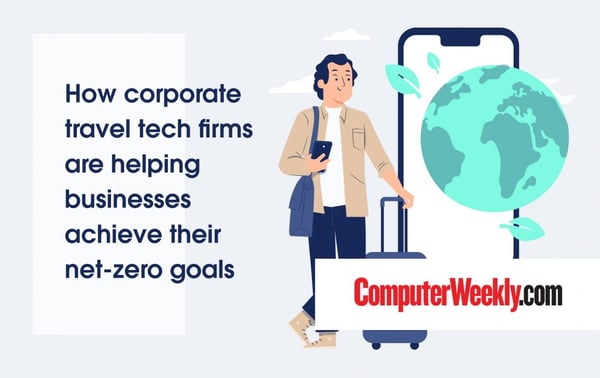Blog / News / 'How corporate travel tech firms are helping businesses achieve their net-zero goals' x ComputerWeekly

News
'How corporate travel tech firms are helping businesses achieve their net-zero goals' x ComputerWeekly
In the wake of the Covid-19 Coronavirus pandemic there is an increased level of pressure on multinational companies to decarbonise at scale. The existential threat of the climate emergency is more relevant than ever and has become a feature in everyday conversations from the bus stop to the boardroom.
In response, many multinational corporations have announced ambitious decarbonisation goals such as PWC’s Net Zero by 2030 goal, and Bentley’s aim of being the number one carbon neutral luxury electric vehicle manufacturer.
However, many of these companies rely on having a globally mobile workforce who can support their operation in different markets. As a result, corporate travel is expected to increase by 38% in 2022. It’s therefore crucial that companies are able to continue corporate and business travel while continuing to build to their net zero goals.
With over a million people travelling for work each week, tech solutions in the corporate travel industry are well overdue. Technology can empower businesses to decarbonise by lowering emissions and providing more transparency around carbon data so that companies can make more sustainable choices.
As is the case in many industries, the corporate travel sector still has a long way to go when it comes to cutting emissions, making sustainable choices and achieving net zero targets. In order to help them along the way, technology providers are making waves when it comes to championing cross-sector collaboration and making it easier for businesses and their employees to book greener accommodation types and destinations.
For example, at AltoVita we are supporting wider industry collaboration through our range of events, including our 2022 Smart, Safe, Sustainable Summit where key figures from the corporate travel industry gathered to discuss how environment, social and governance (ESG) can be implemented in the industry.
AltoVita introduced geotagging to create a more secure verification system, to help make emissions data more transparent, and the Summit explored how technology can enhance ESG in the corporate travel industry. The Summit saw representatives from some of the world’s leading technology, consultancy and global mobility management companies work together on a series of Design Thinking events where they identified over 50 key ESG issues and how they can be solved.
The existential threat of the climate crisis means that it’s crucial for businesses to work together to transition to a more sustainable future. This is especially the case in the travel industry which has faced increased scrutiny following the pandemic. We’ve seen companies like British Airways and Virgin, who are normally competitors, work together in response to Covid. Corporate travel companies need to adopt the same approach to combat safety, security and sustainability issues in the sector.
Many industry leaders have identified that there is a long road ahead for the corporate travel sector before it returns to 2019 levels, with many companies wanting to maintain the cost reductions that they have made during the pandemic when business travel was not possible. The corporate travel sector needs to collaborate to ensure this audience group isn’t permanently lost by creating a new offering and highlighting the benefits of corporate travel.
In contrast to the companies who fall into the greenwashing trap of overpromising and under delivering, taking a community-led approach means that the corporate travel sector can and should work together to ensure that change is delivered across the whole supply chain.
Using technology to empower individuals and businesses
The pandemic exposed the inadequacy of many corporate processes. As a result, many businesses have invested in new technological solutions to replace outdated legacy systems. From the increase in video calls to hybrid working, the way businesses have operated has changed drastically over the last two years. In 2022, businesses and their employees expect technological solutions as standard, especially when it comes to enabling corporate travel. Whether it’s the digital nomad movement or a multinational corporation, business travellers are looking for smarter, safer and more sustainable ways of travelling.
A recent study from the Global Business Travel Association found that while business travel was a priority for 89% of businesses, only 14% felt that the corporate travel industry was “currently well advanced” on sustainability. For many this was because of a lack of data or unclear sustainability features when it comes to corporate travel options.
It’s clear that there’s a huge appetite for more sustainable travel options and many corporate travel companies are creating innovative solutions to meet this demand. For example, AltoVita has developed its platform by including geotagging, which aggregates data on sustainable accommodation. Users will be able to use a smart device to ‘walk through’ a property and ensure that energy, water and waste management sustainability measures are in place.
Many people want to feel that they are playing an active role in making more sustainable choices when travelling. Through AltoVita’s Business to Employee (B2E) model, employees are empowered to use the platform’s sustainability data to make more sustainable choices, all within the parameters set by their employers. The benefits of these innovations will be felt across the corporate travel industry as vendors can utilise AltoVita’s public API for their platforms too.
For many, the travel industry is seen as representative of big business’ environmental impact on the planet. Following the pandemic, where the international travel industry was brought to a complete standstill, the public is now asking where the travel industry fits into a net zero world. It’s imperative that businesses in the travel industry go above and beyond to innovate solutions to prove that the travel industry will be one of the leaders of a more sustainable future.
While corporate travel and relocation is only one part of the sector, their community-focused approach to building a more future-proof offering has set an example for the wider industry.
Previous Article
Our ‘Live Stats’ Reporting Dashboard is Here!
Next Article


